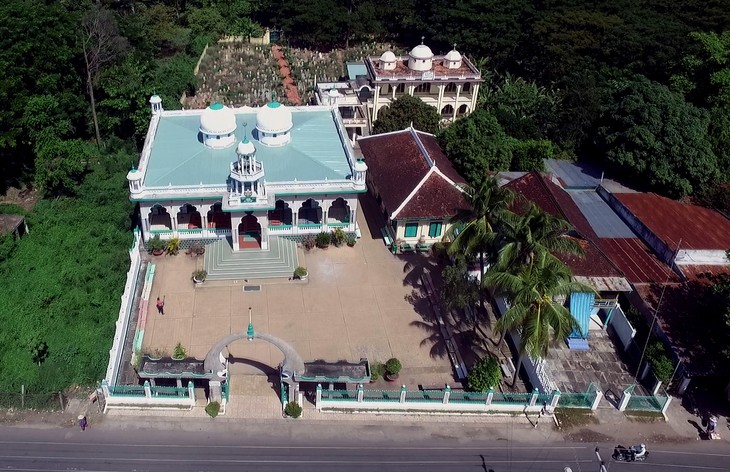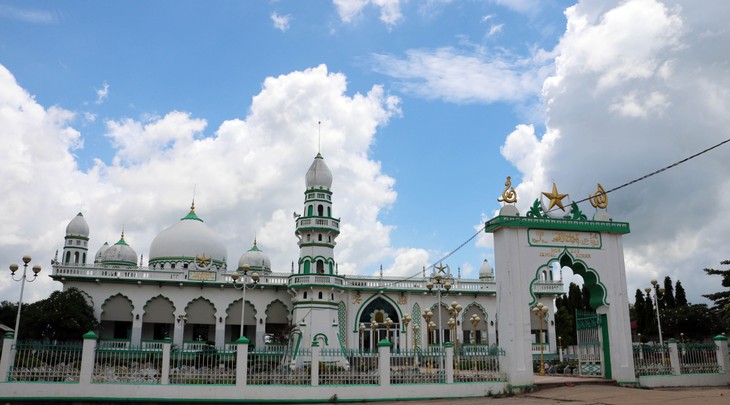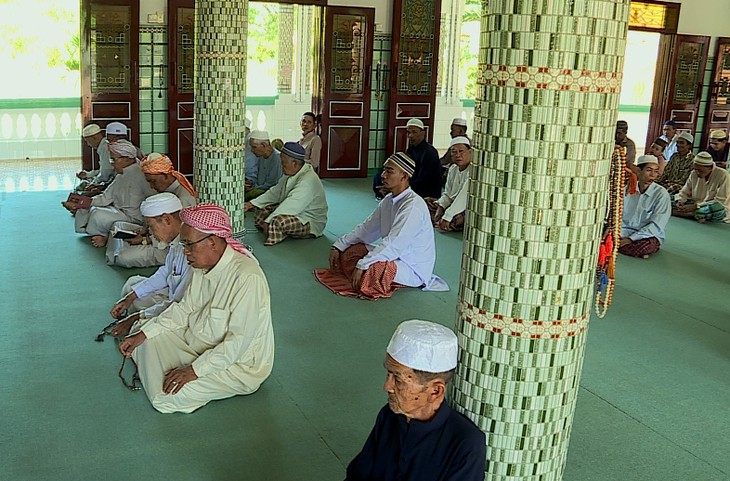(VOVWORLD) - The mosques with their ancient and impressive architecture are where Cham men practice five religious services a day. Cham women are busy at the loom every day. Festivals are rich in spiritual and cultural expressions of the life of the locals. All these have contributed to the special characteristics of Cham ethnic villages at the riverhead of the Mekong Delta.
|
 Cham villages in An Giang province are home to dozens of small and large mosques. Cham villages in An Giang province are home to dozens of small and large mosques.
(Photo: VOV)
|
Cham villages in An Giang province are characterized by wooden stilt houses located along the banks of the Hau River and its branches. Dozens of large and small mosques stand out with four towers in four corners.
Situated in Tan Chau town, Mubarak Mosque is the most famous. Recognized as a national architectural heritage in 2011, Mubarak plays an important role in the spiritual life and religious beliefs of the Cham who must face the direction of the mosque to pray. It is also the place for community activities every Friday.

Cham people’s mosques are famous for the arch architecture. (Photo: VOV)
|
So Ro Les, head of ethnic affairs of Tan Chau town in An Giang province, said: “On Friday, local parishioners gather at the mosque to listen to dogmas, which guide them to follow religious teachings and rules, abide by state regulations, and engage in a healthy civilized lifestyle.”
Language is one of special features of the Cham culture. Most mosques now offer classes to teach the Cham language and Cham script. At daytime, children learn the national language at school. In the evenings, they come to the mosques to learn speaking and writing in their traditional language.
Haji Abdolhamid, Deputy Chief of the Cham Azhar Mosque in Chau Giang hamlet, said: “First we want to help them learn the Koran and learn how to practice religious rituals. Through such activities, they can understand the need to preserve traditional culture and know their mother tongue.”
The Cham people in An Giang have 3 major festivals in the Islamic calendar year - the Roja festival or a pilgrimage to La Mecque Holy Land on the 10th day of the 12th month, Ramadan, also known as the fasting ritual, lasting from the 1st to 30th day of the ninth month, and Prophet Muhammad's birthday on the 12th day of the third month.
During the holy month of Ramadan, wherever the Cham people go or work, they will try to return home to perform religious rites.
After the end of Ramadan, the Cham will begin the Roja or Haij festival, a traditional holiday to celebrate a new year. The locals slaughter goats and cows to hold celebrations at mosques after a year of hard work. This is also the time when traditional cultural and art activities are organized.
 All the Cham must turn face to the direction of the mosque while praying. All the Cham must turn face to the direction of the mosque while praying. |
Haji Chau Ka Dua, Secretary of the Management Board of Mubarak Mosque, told VOV: “Ramadan is a sacred month for Muslims. During the annual religious festival, Muslims fast from sunrise to sunset will be fasting – no food, no water and all that is forbidden by the Koran. The move aims to help them understand the lives led by poor people, the meaning of sharing.”
The Cham’s traditional costumes are unique. Both men and women wear a special dress called a ‘Sarong’ throughout their daily and festival activities. On men’s heads, there is the typical cloth hat of Muslim followers with embroidery motifs. Cham women wear a scarf called a Matora or Khanh Maom around their head and then cover their shoulders.
Ro Mak, a weaver of Cham Chau Phong village in Tan Chau town, said that from a young age, Cham girls have been taught how to cook traditional dishes and especially the traditional craft of embroidery and brocade weaving.
“Though brocade weaving is a hard work, I feel happy to do it because it’s our traditional craft. I’ll try my best to preserve it. We make three types of brocade products. Other items are bought from different villages to sell for visitors and the locals,” said Ro Mak.